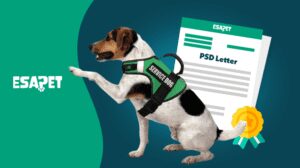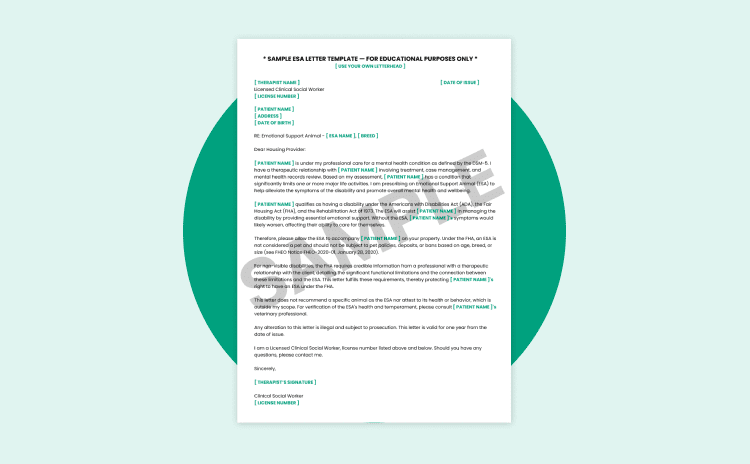Emotional Support Animal: Definition, Rights, Responsibilities & How to Get One in 2026

Emotional Support Animals (ESAs) play a vital role in providing comfort, stability, and companionship for people living with emotional or mental health challenges. But understanding exactly what an ESA is, the rights that come with having one, and the responsibilities of owners can sometimes feel confusing. This guide is designed to make everything clear and accessible, so you know not only what qualifies as an ESA but also how it can improve daily life.
In the sections ahead, we’ll cover the official definition of an Emotional Support Animal, explain your legal rights under housing and travel laws, and outline the responsibilities that come with being an ESA owner. We’ll also guide you step by step on how to obtain a valid ESA letter, ensuring the process is simple, compliant, and stress-free. By the end, you’ll have a complete understanding of ESAs and the confidence to start your own journey.
What is an Emotional Support Animal (ESA)?
An Emotional Support Animal (ESA) is an animal that provides emotional, cognitive, or similar support to an individual with a qualifying mental or emotional disability. ESAs are defined under several state housing statutes and recognized federally under the Fair Housing Act (FHA) as a type of “assistance animal”. According to the U.S. Department of Housing and Urban Development (HUD), an ESA is not a pet but “an animal that provides emotional support that alleviates one or more identified symptoms or effects of a person’s disability.”
An ESA is not required to undergo specialized training, unlike a service animal that must perform specific tasks. The Americans with Disabilities Act (ADA) clearly states that “emotional support animals, comfort animals, and therapy animals are not service animals under Title II and Title III.” Therefore, an ESA does not have public access rights under the ADA.
An ESA can be any species and is most commonly an ESA dog or cat. In housing, an ESA is legally protected under the FHA. A landlord must reasonably accommodate an ESA when a tenant provides documentation from a licensed health care provider, confirming the disability and the need for the animal. Airlines and public places, however, are generally not required to admit ESAs.
Get your Official ESA Letter Consultation from a licensed therapist.
Get ESA Letter Now
Who Qualifies for an Emotional Support Animal?
A person qualifies for an Emotional Support Animal (ESA) if they have a diagnosed mental or emotional disability that substantially limits one or more major life activities, and a licensed health professional confirms the animal provides therapeutic support for that condition.
To legally qualify for an ESA, a person must meet the following core requirements:
- Have a mental or emotional disability recognized under the Fair Housing Act or Section 504 of the Rehabilitation Act. This includes conditions that impair daily functioning such as communication, self-care, or social interaction.
- Show a disability-related need for the ESA. The animal must help alleviate specific symptoms or effects of the disability—not just provide general comfort.
What Mental Disabilities Qualify for ESAs?
Any mental or emotional disability recognized by the Diagnostic and Statistical Manual of Mental Disorders, Fifth Edition (DSM V) qualifies for an ESA.
The 6 conditions that most people get emotional support animals for are:
- Anxiety Disorders – Including generalized anxiety disorder (GAD), panic disorder, and social anxiety. ESAs provide calming presence and reduce panic frequency.
- Major Depression – ESAs reduce isolation, improve mood, and help individuals re-engage with daily routines.
- Post-Traumatic Stress Disorder (PTSD) – An ESA can offer grounding during flashbacks or nightmares, reduce hypervigilance, and help manage emotional triggers.
- Obsessive-Compulsive Disorder (OCD) – An ESA may interrupt compulsive behavior cycles and provide emotional stability.
- Bipolar Disorder or Schizophrenia – Emotional support animals can offer consistent companionship, especially during mood swings or psychotic episodes.
Required Documentation from Licensed Professionals
To qualify for an ESA you must obtain a written recommendation (ESA letter) from a licensed healthcare provider. This documentation must:
- Be issued by a qualified practitioner (e.g., psychiatrist, psychologist, physician, social worker).
- Confirm the person’s disability and explain how the ESA alleviates symptoms.
Reflect an established provider-patient relationship, often for 30 days or more, depending on state law
Some states have enacted laws tightening ESA documentation requirements. For example:
California (AB 468) – Requires at least a 30-day patient-provider relationship and a clinical evaluation before issuing an ESA letter.
Montana, Iowa, Arkansas, Florida, and Colorado – Also mandate similar relationship timelines and restrict letters issued by out-of-state or online-only providers.
ESA Qualification in Housing
Under the Fair Housing Act, tenants qualify for reasonable accommodations from their landlords if they meet 3 criteria:
- A valid ESA letter is provided.
- The animal does not pose a direct threat or cause significant property damage.
- The tenant’s disability or the ESA’s purpose is not readily apparent, and documentation is presented upon request.
Emotional Support Animal vs. Service Dog vs. Therapy Animals
Understanding the distinctions between Emotional Support Animals (ESAs), Service Dogs, and Therapy Animals is essential when navigating legal rights, responsibilities, and access—particularly when considering public access and exotic animals.
Each category differs in its definition, function, training requirements, and legal protections under federal laws like the Americans with Disabilities Act (ADA), the Fair Housing Act (FHA), and the Air Carrier Access Act (ACAA).
Service Animals: Task-Driven and Legally Protected in Public
Under the ADA, service animals are defined as dogs (and in some cases, miniature horses) that are individually trained to perform specific tasks related to a person’s disability. These tasks must directly mitigate the disability—examples include guiding individuals with visual impairments, alerting those who are deaf, pulling wheelchairs, or interrupting panic attacks. Emotional support alone is not recognized as a qualifying task.
Service animals are granted public access rights under Titles II and III of the ADA. Businesses and public institutions must allow them in all areas open to the public. However, exotic animals do not qualify as service animals. The ACAA also limits air travel recognition of service animals to trained dogs only, aligning with the ADA definition.
Emotional Support Animal: Housing Protections Without Public Access
An ESA is an animal that provides therapeutic emotional or psychological support to individuals with diagnosed disabilities. ESAs are not required to be trained to perform specific tasks. Their legal recognition centers on the animal’s benefit through presence and companionship.
While ESAs like ESDs have no public access rights under the ADA, they are protected under the Fair Housing Act, which requires landlords to provide reasonable accommodation—even for animals not typically allowed under “no-pet” policies—if the individual can demonstrate a disability-related need.
The FHA does not restrict species, meaning exotic animals (e.g., birds, rabbits, reptiles) may be allowed as ESAs in housing, assuming no direct threat or property damage concerns. However, since 2021, the ACAA excludes ESAs from special air travel status, allowing airlines to treat them as regular pets. Some airlines still accommodate ESAs.
Therapy Animals: Group-Oriented Comfort Providers Without Individual Rights
Therapy animals are usually obedience-trained and used in group or clinical settings to provide comfort and reduce stress for multiple individuals, such as hospital patients, students, or disaster victims. They are not recognized as service or assistance animals under federal law, as they do not assist a single individual with a disability nor receive specialized task training.
Therapy animals do not have federal public access rights, except in rare state-level exceptions (e.g., Kansas permits professional therapy dogs access to food establishments with documentation).
Comparison: ESA vs Service Dog vs Therapy Dog
🧩 Function
Service Dog: Performs task(s) for one person’s disability
Emotional Support Animal (ESA): Provides emotional/psychological support
Therapy Animal: Offers comfort to multiple individuals
🎓 Training Required
Service Dog: Yes – Task-specific training
ESA: No training required
Therapy Animal: Often obedience/social training
📜 Public Access (ADA)
Service Dog: Yes
ESA: No
Therapy Animal: No
🏠 Housing Access (FHA)
Service Dog: Yes
ESA: Yes
Therapy Animal: No
✈️ Air Travel (ACAA)
Service Dog: Yes (dogs only)
ESA: No (treated as pet)
Therapy Animal: No (treated as pet)
🐾 Species Allowed
Service Dog: Dogs (miniature horses in some cases)
ESA: Any species (in housing only)
Therapy Animal: Any species
📄 Documentation Required
Service Dog: No (but verification allowed)
ESA: Yes – from licensed healthcare provider
Therapy Animal: Varies by organization
In summary, service animals are task-trained and federally protected in nearly all settings. ESAs receive housing protections under the FHA but not public access under the ADA. Therapy animals serve a valuable role in clinical and communal spaces but are not legally protected as assistance animals. Legal treatment of animals depends on their role, training, and context, not just the emotional bond they provide.
How Much Does an Emotional Support Animal (ESA) Cost?
The total cost of owning an Emotional Support Animal (ESA) includes both the administrative expense of obtaining an ESA letter and the ongoing care costs of the animal. ESA letters typically range from $49 to $400, depending on the provider and whether it’s for housing, travel, or both. Licensed mental health professionals may issue these letters as part of a treatment plan, while online platforms charge between $95 and $250. Renewals are often needed annually, adding to the ongoing cost.
Monthly care costs vary by species and location. For cats, owners spend between $80 and $310/month, or up to $4,195 annually. For ESA dogs, monthly expenses range from $120 to $435, totaling up to $4,170/year. These include food, vet care, insurance, grooming, and supplies. Upfront adoption and setup costs add another $1,150–$4,420.
Location also matters—cities like New York and San Francisco are the most expensive, while places like Lawton, OK, are far more affordable. Over a lifetime, an ESA can cost between $13,000 and $73,000, depending on species, breed, and medical needs. Despite the cost, the therapeutic benefits ESAs provide often outweigh the financial commitment for those who need them.
What Animals Can Be Emotional Support Animals?
All animals can be emotional support animals as long as they provide comfort and emotional relief. While dogs and cats are the most common and well-known ESAs, other animals are also recognized and accepted under federal law, provided they fulfill the emotional needs of their owners.
Beyond dogs and cats, other animals such as rabbits, birds (like parrots or canaries), guinea pigs, and miniature horses may also qualify as ESAs. These animals can provide comfort and companionship, particularly for people with allergies or specific living environments where dogs or cats may not be suitable.
Exotic Animals and Challenges
While exotic animals such as snakes, reptiles, or rodents can sometimes serve as ESAs, they often face additional challenges in securing housing approval or airline accommodations. Exotic pets may raise concerns about safety, allergies, or cleanliness, so it’s important to understand the potential hurdles before choosing an exotic animal as your ESA.
3 Factors to Consider When Choosing an ESA
When selecting an ESA, it’s important to consider:
- Temperament: The animal should have a calm, gentle nature to help reduce stress rather than add to it.
- Size: Consider your living space and the animal’s needs. Larger animals might not be suitable for small apartments.
- Housing Environment: Some landlords or housing providers may have policies restricting certain animals based on size, species, or breed.
Legal Restrictions and Housing Provider Limits
Housing providers may impose reasonable limits based on safety, sanitation, or animal size. For example, some landlords may not allow large or exotic animals or may require that the animal does not pose a threat to other residents.
Benefits of Emotional Support Animals (ESAs)
There are 6 main ESA benefits—validated by peer-reviewed studies—highlight the therapeutic value of ESAs as part of comprehensive behavioral health care:
- Reduced Stress and Cortisol Levels: ESAs lower physiological stress by reducing cortisol levels and promoting relaxation responses.
- Alleviation of Depression: ESAs improve mood and emotional well-being by providing emotional grounding and consistent companionship.
- Decreased Loneliness and Social Isolation: ESAs encourage social engagement and reduce feelings of loneliness by acting as empathetic companions.
- Strengthened Emotional Attachment: ESAs form secure attachment bonds that support emotional regulation and trauma recovery.
- Improved Daily Functioning: ESAs contribute to behavioral consistency and emotional resilience by offering routine and comfort in daily life.
- Support for Children with ADHD: Interaction with dogs helps children with ADHD improve attention, mood regulation, and reduce disruptive behaviors.
1.Emotional Regulation and Cortisol Reduction
ESAs help mitigate stress responses by lowering cortisol levels—the body’s primary stress hormone—during periods of psychological strain per the study: Pendry, P., & Vandagriff, J. L. (2019). Animal visitation program reduces cortisol levels of university students: A randomized controlled trial. AERA Open, 5(3), 2332858419852592
2.Alleviation of Depression and Emotional Distress
Emotional support animals can act as attachment figures, helping reduce symptoms of depression, trauma, and loneliness by offering emotional grounding and consistency per the study: Younggren, J. N., Boisvert, J. A., Boness, C. L., Bryan, M. A., & Douglass, A. B. (2023). Exploring benefits of emotional support animals: ESAs as attachment figures. Professional Psychology: Research and Practice. Advance online publication
3.Decreased Loneliness and Social Withdrawal
ESAs increase social engagement and reduce withdrawal symptoms by providing companionship that encourages users to interact more confidently with their environment per the study: Griffin, J. A., Hurley, K., & McCune, S. (2022). Emotional support animal partnerships: Behavior, welfare, and clinical involvement. In Fine, A. H. (Ed.), Handbook on animal-assisted therapy: Foundations and guidelines for animal-assisted interventions (5th ed., pp. 179–197). Academic Press
4.Strengthened Attachment and Emotional Security
The consistent, nonjudgmental presence of an ESA builds attachment-based security, helping users regulate emotional highs and lows, particularly among trauma survivors per the study: Younggren, J. N., Boisvert, J. A., Boness, C. L., Bryan, M. A., & Douglass, A. B. (2023). Exploring benefits of emotional support animals: ESAs as attachment figures. Professional Psychology: Research and Practice.
5.Mental Health Support for ADHD and Children
Dogs support emotional regulation, improved focus, and reduced disruptive behavior in children with ADHD—suggesting potential applications of ESAs for similar populations per the study: Schuck, S. E. B., Emmerson, N. A., Fine, A. H., & Lakes, K. D. (2015). Canine-assisted therapy for children with ADHD: Preliminary findings from the Positive Assertive Cooperative Kids study. Journal of Attention Disorders, 19(2), 125–137.
6.Emotional Support During Daily Functioning
Through predictability and emotional presence, ESAs help users develop routine and behavioral consistency, improving daily functioning and emotional resilience per the study: Griffin, J. A., Hurley, K., & McCune, S. (2022). Emotional support animal partnerships: Behavior, welfare, and clinical involvement. In A. H. Fine (Ed.), Handbook on Animal-Assisted Therapy (5th ed., pp. 179–197). Academic Press.
Emotional Support Animals provide quantifiable emotional, physiological, and psychological benefits. From reducing cortisol and anxiety to improving social connection and attachment regulation, ESAs serve as evidence-backed interventions that enhance the well-being of individuals with emotional or psychiatric disabilities.
Get your Official ESA Letter Consultation from a licensed therapist.
Get ESA Letter Now
What is an ESA Certification?
ESA certification is a registration service offered by some online ESA letter providers. It’s important to know that ESA certification is not legally required. The only official and legally valid document is an ESA letter from a licensed mental health professional. Many commercial sites offer “ESA certifications” or registrations that have no legal standing and do not substitute for an ESA letter.
Emotional Support Animal Laws
Emotional Support Animal (ESA) laws vary across contexts—housing, travel, and public access—primarily governed by federal statutes like the ADA, FHA, and recent DOT regulations. ESAs are not service animals under the ADA, so public businesses are not legally required to admit them. However, under the Fair Housing Act (FHA), housing providers must make reasonable accommodations, allowing ESAs in “no-pet” housing if there’s a documented disability-related need. This protection can apply to any species, not just dogs or cats.
As of January 10, 2021, the Department of Transportation (DOT) revised its rules under the Air Carrier Access Act (ACAA), allowing airlines to treat ESAs as pets. Airlines are no longer required to accept ESAs and may charge fees or apply pet restrictions.
To qualify for housing accommodations, individuals must present reliable documentation from a licensed health professional. ESA letters must reflect a clinical evaluation and cannot rely solely on online certifications. Requests may be legally denied if the animal poses a direct threat to others or causes unmitigable property damage, based on actual behavior—not breed or size assumptions.
Who Can Write an ESA Letter?
ESA letters must be written by licensed health professionals who can assess an individual’s emotional or psychological needs. Qualified professionals include psychologists, psychiatrists, licensed clinical social workers (LCSWs), licensed professional counselors (LPCs), physicians, nurse practitioners, and physician’s assistants.
Federal law does not require a specific format for ESA letters, but documentation must demonstrate a disability-related need for the animal’s support. The letter should indicate that the provider has personal knowledge of the individual’s condition. Many states impose additional safeguards: for instance, California and Iowa require a 30-day pre-existing therapeutic relationship and a clinical evaluation before issuing ESA documentation.
These state-level requirements are designed to curb misuse and ensure that ESA letters are medically justified. Online services may help initiate the process, but letters must come from professionals licensed in the state where the individual resides, and casual online certifications are often considered insufficient.
How to Get an ESA Letter
To legally obtain an ESA letter:

Pre-Screening

Licensed Therapist

Your Letter
- Schedule a consultation with a licensed mental health provider.
- Discuss your emotional or psychological symptoms and how an animal may alleviate them.
- If qualified, receive a signed ESA letter that includes the provider’s license details, confirmation of disability-related need, and specifics of how the animal provides support.
States like California enforce additional standards, such as requiring the professional to treat the individual for at least 30 days before issuing the letter. Some services, such as ESA Pet, assist with telehealth consultations to connect individuals with licensed professionals for this process.
Are Emotional Support Dogs Allowed on Flights?
Emotional support animals (ESAs), including dogs, are no longer legally protected for air travel. Since 2021, after changes to the Air Carrier Access Act (ACAA), airlines are no longer required to allow ESAs in the cabin. They are now treated as regular pets, subject to fees, size/breed restrictions, and each airline’s specific policies.
The exception is for service dogs (including psychiatric service dogs), which remain legally protected and can travel in the cabin free of charge, as long as they meet training and documentation requirements.
→ Read the full guide on ESAs and flights
Conclusion
Getting an emotional support animal can be a life-changing step for those dealing with emotional or psychological challenges. Understanding the proper process — starting with a thorough evaluation by a licensed mental health professional and obtaining a valid ESA letter — is essential to ensure your rights and protections.
Remember, ESAs differ from service and therapy animals, and while many types of animals can provide emotional support, choosing the right companion and following legal guidelines will make the process smoother. Avoid unofficial certifications and always rely on licensed professionals to secure your ESA documentation.
With the right support and knowledge, you can confidently enjoy the benefits that an emotional support animal brings to your well-being and daily life.
Get your Official ESA Letter Consultation from a licensed therapist.
Get ESA Letter Now
Service Animals, ESA and Service Animal Rights, Psychiatric Service Dog
Real Service Dog Vest vs. Fake: WhatR...
Jonalyn Dionio
Dec 12 2025

Psychiatric Service Dog, ESA and Service Animal Rights, Service Animals
Proof of Service Dog: How to Identify a ...
Jonalyn Dionio
Dec 12 2025






